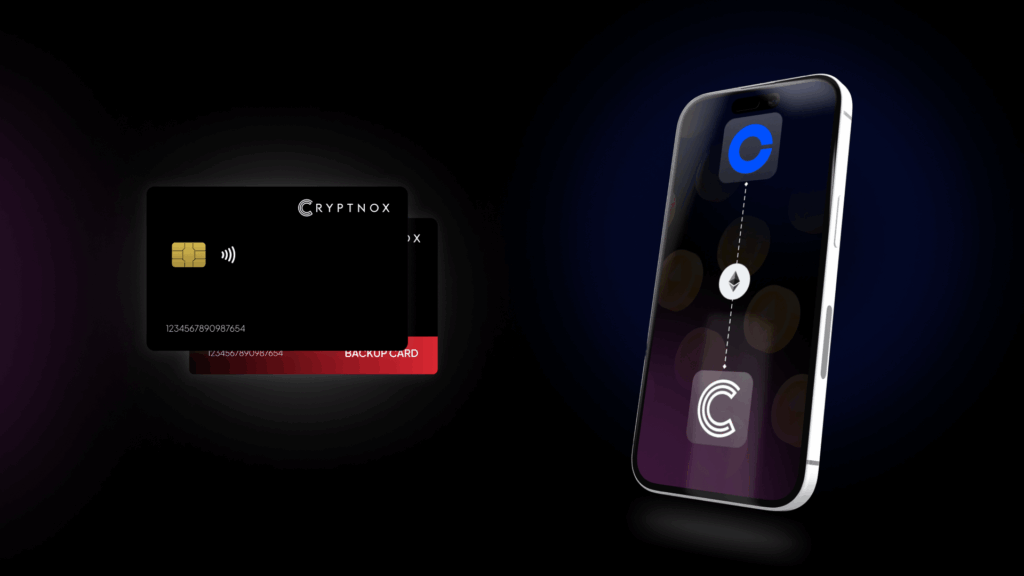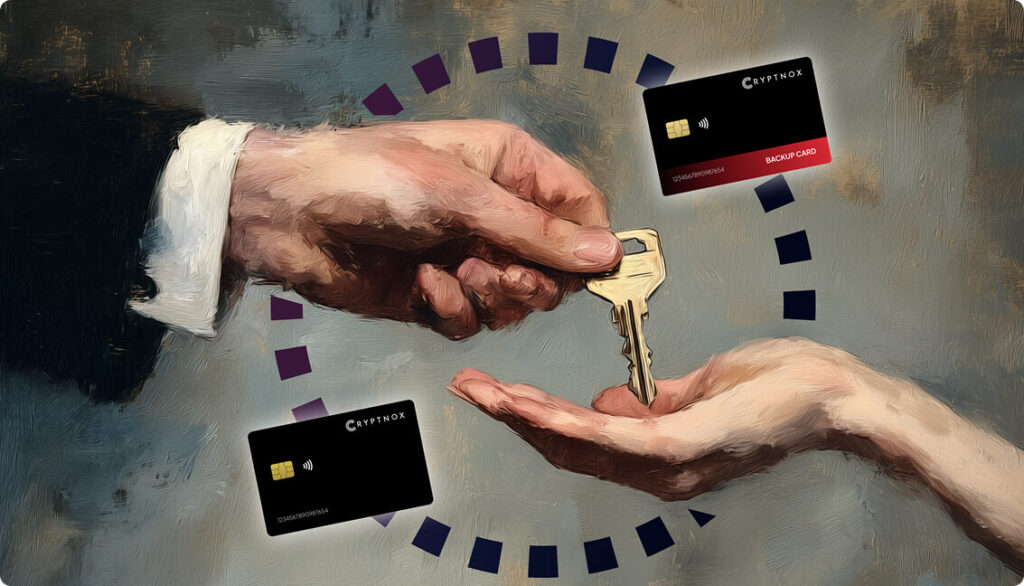Imagine a world where your money is completely under your control. No banks. No middlemen. Just you, your funds, and the digital space. Sounds like an illusaory story, right? Not anymore.
Welcome to the exciting world of crypto hardware wallets! With this kind of wallet, you’re not just storing wealth; you’re part of a global movement reshaping how we think about money and ownership.
Every transaction you make contributes to a decentralised ledger that spans the globe, creating a network where everyone can see what’s happening, yet only you hold the keys to your own digital kingdom.
So whether you’re a crypto enthusiast or a curious newcomer peeking into the future of finance, buckle up and get ready – let’s delve into the wonders of crypto hardware wallets and the benefits they bring to the table.
What is a Crypto Hardware Wallet?
A crypto hardware wallet allows users to quickly and securely access their digital assets. It is sometimes referred to as a cryptocurrency wallet or, most popularly, a blockchain wallet.
Wikipedia defines it as “a device, physical medium, program or an online service which stores the public and/or private keys for cryptocurrency transactions. In addition to this basic function of storing the keys, a cryptocurrency wallet more often offers the functionality of encrypting and/or signing information.”
It’s like a secure digital vault for the special keys that unlock your assets on the blockchain itself.
Here’s a breakdown:
Think of the crypto hardware wallet as a giant public ledger: Every cryptocurrency transaction is recorded here, creating a transparent and secure record of ownership.
Your private key is like a master password: This unique code allows you to sign off on transactions, proving you own the crypto associated with a specific blockchain address.
A crypto hardware wallet securely stores your private key. It also provides a user-friendly interface to interact with the blockchain, allowing you to:
- Send and receive cryptocurrency
- View your transaction history
- Potentially access DeFi features
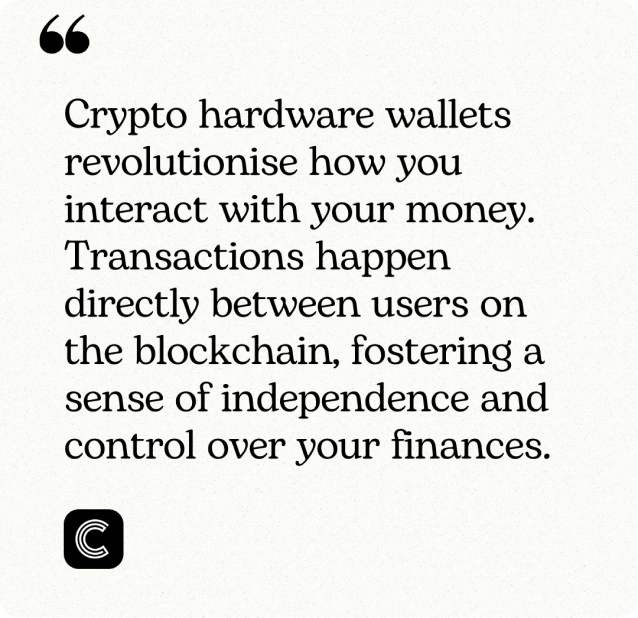
Benefits of Using a Crypto Hardware Wallet
Using a crypto hardware wallet comes with a wide range of benefits, making it an attractive option for managing digital assets. Consider just a few:
- Unparalleled Security: Crypto hardware wallets use advanced cryptographic techniques to secure transactions and private keys. Most Crypto hardware wallets are decentralised, meaning that the funds are not held by a central authority, reducing the risk of hacking or fraud.
- Enhanced Control (Be Your Own Bank): Crypto hardware wallets revolutionise how you interact with your money. You become your own bank, free from the limitations and regulations of traditional financial institutions. Transactions happen directly between users on the blockchain, fostering a sense of independence and control over your finances.
- Transparency and Immutability: The blockchain technology underlying Crypto hardware wallets acts as a tamper-proof public ledger. Every transaction is permanently recorded and viewable by anyone, creating an auditable and verifiable record of ownership. This fosters trust and transparency in all your crypto interactions. You can easily track your transaction history and confirm the legitimacy of any funds you receive.
- Unleashing Innovation: A Gateway to the Future of Finance (Web3, DAOs, and the Metaverse): Crypto hardware wallets empower you to participate in the burgeoning world of Web3, the next iteration of the internet built on the tenets of decentralization, transparency, and user empowerment. As the blockchain ecosystem continues to evolve, your wallet could become the key to interacting with a universe of groundbreaking applications, from decentralized lending protocols to predictive markets and beyond.
It is important to note that while Crypto hardware wallets offer a wealth of benefits, they also come with the responsibility of safeguarding your private keys. Choosing a reputable wallet and implementing strong security practices are crucial for protecting your digital assets.
How Crypto hardware wallets differ from traditional wallets
Imagine a traditional wallet as a safe deposit box at a bank. The bank controls access and manages your funds. Crypto hardware wallet is like a personal vault with a combination lock, only you know. Crypto hardware wallets and traditional wallets differ significantly in terms of security, control, ownership, functionality, transparency and fees.
Security
Traditional Wallet: Banks have robust security measures, but hacks and breaches can still occur. You may be limited to recovering stolen funds.
Crypto Hardware Wallet: Security depends on you safeguarding your private key. Choose a reputable wallet and implement strong security practices to minimize the risk of theft. However, once compromised, recovering funds might be difficult.
Control and Ownership
Traditional Wallet: You entrust your money to a central authority like a bank. They hold your funds and control access, dictating transaction fees and limitations.
Crypto Hardware Wallet: You are the sole custodian of your cryptocurrency. The wallet stores your private key, giving you complete control over your funds. You can transact directly with others without relying on a bank.
Functionality
Traditional Wallet: Designed for storing and spending physical cash or cash equivalents like debit cards. They may offer limited features such as online bill pay or rewards programs but generally focus on core transactional capabilities.
Crypto Hardware Wallet: Many wallets offer functionalities beyond storage:
Send and receive cryptocurrency directly with others.
Engage with decentralised finance (DeFi) applications, enabling you to lend, borrow, stake your crypto, and potentially earn interest in your holdings.
Manage NFTs and potentially other digital assets stored on blockchain.
Understanding Blockchain Technology
Imagine a digital ledger, like a book that records every single transaction ever made.
This ledger isn’t stored in one place but spread out across a network of computers all over the world. Each of these special computers (nodes) on the network verifies the transactions using complex mathematical algorithms. Every verified transaction is added to the ledger in the form of a ‘block’.
Each block is linked to the previous one (called a hash), creating a chain of blocks (hence, the name “blockchain”).
These blocks are secured using cryptography, a fancy way of scrambling information, making them virtually impossible to alter or tamper with.
This means that the blockchain is a permanent, transparent, and secure record of every transaction that has ever occurred.
Using a Crypto Hardware Wallet (Understanding Wallet Types)
Choosing a Crypto hardware wallet is like picking a safe for your money. There are different types, each with its own strengths and weaknesses. By understanding the wallet types, you can pick one that fits your security needs and how you plan to use your cryptocurrency.
Custodial Wallets (like online bank accounts)
Easier to use, if someone else holds your private key (like a password) for you.
Less secure, and relies on a third party for safekeeping. This means you’re trusting that the company or service you use has robust security measures in place to protect your cryptocurrency. If they are hacked or experience a security breach, your funds could be at risk. Additionally, custodial wallets may limit your ability to control your own funds. For example, some custodial wallets may restrict you from sending your cryptocurrency to certain addresses or using it for certain purposes.
Non-custodial Wallets (you hold the key)
More securely, you have complete control over your private key.
Requires more responsibility if you lose your key, your crypto is gone.
Hot Wallets (connected to the internet): These are convenient for everyday transactions because you can easily access them from your phone or computer. However, since they are always online, they are more susceptible to hacks and malware. Examples of hot wallets include mobile wallets and web wallets.
Cold Wallets (offline storage): These are the most secure options for storing cryptocurrency because they are completely isolated from the internet. This makes them ideal for long-term holdings of cryptocurrency that you don’t plan on spending very often. Hardware wallets are popular cold storage options because they are relatively easy to use and provide a secure way to store your private keys. Paper wallets are another type of cold storage, but they can be risky because they are vulnerable to damage or loss.
An example of a brand that offers top-notch hardware wallet security solutions is Cryptnox. Cryptnox offers solutions that use cutting-edge technology that guards against advanced threats and ensures the highest level of data integrity. With Cryptnox card, your transactions are secured by one of the most sophisticated technologies on the market.
Finding Your Crypto Hardware Wallet Address
An important principle of Crypto hardware wallets to understand is that cryptocurrencies aren’t physically stored in your wallet; they exist as data on a Blockchain.
Your wallet serves as the keeper of the keys – a public key (like your account number) and a private key (similar to a bank card’s PIN). Your wallet software uses these keys to interact with the Blockchain.
When you buy cryptocurrency, you receive a wallet with an address. Please use this wallet address to receive payment. If you want to send cryptocurrency, you also need to enter the recipient’s address.
How can you locate your wallet address? The method for locating your Crypto hardware wallet address depends on the type of wallet you’re using:
Custodial Wallets
Look for the “Receive” or “Deposit” section within your wallet app or website.
This section will typically display your wallet address in both text and QR code format.
Non-custodial Wallets
Hot Wallets (Mobile/Web Wallets)
The process will vary depending on the specific wallet you use. Generally, there will be a “Receive” or “Deposit” function within the app/website.
Look for the option to “Show Address” or “Copy Address”. This will display your wallet address.
Cold Wallets (Hardware/Paper Wallets)
Hardware wallets usually have a dedicated button or menu option to display the address on the device screen.
Paper wallets have the address printed directly on the paper.
Important Tips:
Always double-check the address before sharing it to receive cryptocurrency.
Never share your private key with anyone, not even the wallet provider for custodial wallets.
Understanding different types of addresses
Cryptocurrency addresses, like your mailbox for digital coins, come in different formats depending on the currency and its features. Consider a few:
- Bitcoin addresses: These are addresses that start with a “1” or “3” and contain between 26 and 35 alphanumeric characters. They’re the most common type of crypto address. Examples: 1A1zP1eP5QGefi2DMPTfTL5SLmv7DivfNa or 3J98t1WpEZ73CNmQviecrnyiWrnqRhWNLy.
- Ethereum addresses: These addresses begin with “0x” and are slightly longer than Bitcoin addresses, usually containing 42 characters. Example: 0xde0B295669….
- Litecoin addresses: These addresses are similar to Bitcoin addresses, but they start with an “L” or “M” and are longer (34-36 characters). Example: LZ1qLJLK1XuoZGbxFoeF3BQ2zRkhy9k1P5.
- Ripple (XRP) addresses: These start with an “r”, contain between 25 and 34 characters, and are case-sensitive. Example: rPEPPER7kfTD9w2To4CQk6UCfuHM9c6GDY.
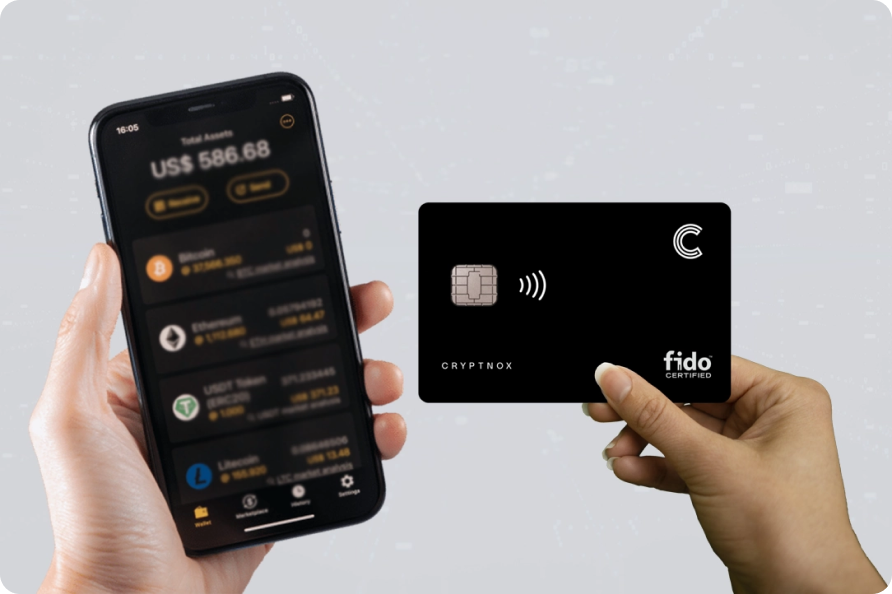
Transacting With Your Crypto Hardware Wallet
Transacting with a Crypto hardware wallet involves sending and receiving cryptocurrency, depositing fiat money to convert to cryptocurrency, and withdrawing cryptocurrency back to fiat.
Here’s how you can do all these actions:
General Tips
Backup Your Wallet:
- Regularly back up your wallet and securely store private keys and recovery phrases.
Security:
- Use strong passwords, enable 2FA, and consider using hardware wallets for significant amounts of cryptocurrency.
Double-Check Addresses:
Always double-check wallet addresses when sending or receiving funds to avoid errors.
Understand Fees:
- Be aware of transaction fees for sending, receiving, converting, and withdrawing funds. The fees usually range from a few cents to a few dollars, depending on the size and complexity of the transaction.
A Look at Crypto Withdrawal Options
Crypto-to-Crypto Exchanges: These enable you to exchange one cryptocurrency for another and then withdraw to a wallet that supports the new currency. For example, you could exchange Bitcoin for Litecoin and then withdraw to a Litecoin wallet.
- Fiat Withdrawals: Some platforms let you withdraw funds directly from your bank account in your local currency (fiat currency). These withdrawals may take a few days to process and may incur a fee.
- Peer-to-Peer Exchanges: Using these platforms, you can withdraw directly to another person’s wallet in exchange for cash or other payment methods.
- Crypto ATMs: These are physical ATMs that allow you to withdraw cash from your crypto wallet. They’re not as common as traditional ATMs, but they’re becoming more popular in major cities.
Security and Best Practices
Your Crypto hardware wallet holds your private keys so it is crucial to secure them from the prying eyes of sneaky bandits.
- Choose a strong password: Include upper and lower case letters, numbers, and special characters to make it harder to crack. Think of your crypto wallet as your apartment. A strong password is like a deadbolt lock on your door.
- Use biometric technology: Most Crypto hardware wallets utilize biometric technology (such as fingerprints or facial recognition), which uses your individual traits to authenticate your identity. They are very effective since they can’t be duplicated or faked.
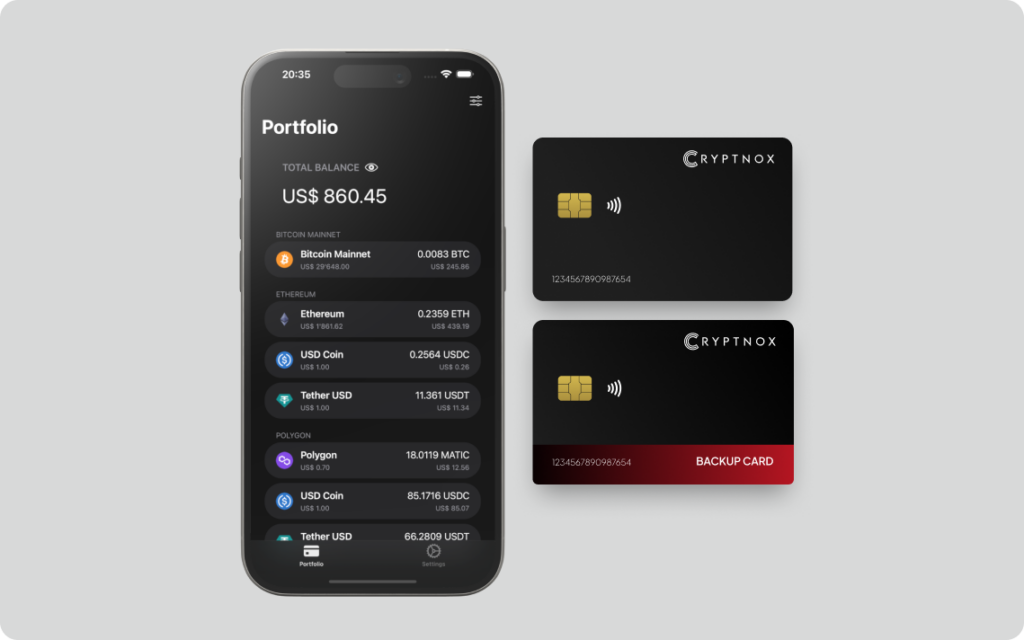
Why Choose Cryptnox Hardware Wallet?
Cryptnox hardware wallet is an innovative solution to protect your digital assets. Its simplicity and ease of use are what attract users, ensuring that their keys are backed up without hassle. With just a few taps, you can easily set up, manage and safeguard your Crypto hardware wallet via a single interface. Below are some other reasons why Cryptnox hardware Wallet is the best choice:
Robust Security
Cryptnox takes security a notch higher. Unlike traditional hardware wallets, your private key never leaves a secure element of the card.
All transactions are signed and validated within the card itself, eliminating any risk of exposure to malware or hackers. Additionally, biometric access through your phone adds another layer of protection. With a secure element key linked to your phone’s biometrics, you can connect to the blockchain while keeping your private key safely isolated within the Cryptnox card. This two-factor approach provides unparalleled security for your cryptocurrency. You can be confident that Cryptnox cards ensure the security, authenticity and integrity of your online transactions.
Ease of Use
You can easily authenticate your blockchain transactions and safeguard your cryptocurrencies through the Cryptnox mobile app. For security purposes, you can use biometric authentication at any time you wish to safely access your digital wallet.
Compatibility
A key feature of Cryptnox hardware wallet is its compatibility with MetaMask. This feature enables users to utilise the entire Web3 functionality and technologies like GameFi, NFTs and DeFi. It is also excellent for handling your assets on networks such as Polygon, Ethereum and a lot more.
Cryptnox hardware wallet also supports BIP39 seed phrases, which are a string of words that enable easy back up and retrieval, in case of loss.
Conclusion
This article explores the value of a Crypto hardware wallet and how it enables you to secure your cryptocurrencies or digital assets. It is also a perfect way to protect your online transactions from hacks, phishing, account takeovers and other forms of cyber crime. Since you need to use a physical card each time you want to conduct transactions, it is unlikely that any unauthorized access will occur.
Ready to explore the unique features of Cryptnox hardware wallet? You can get one here.


